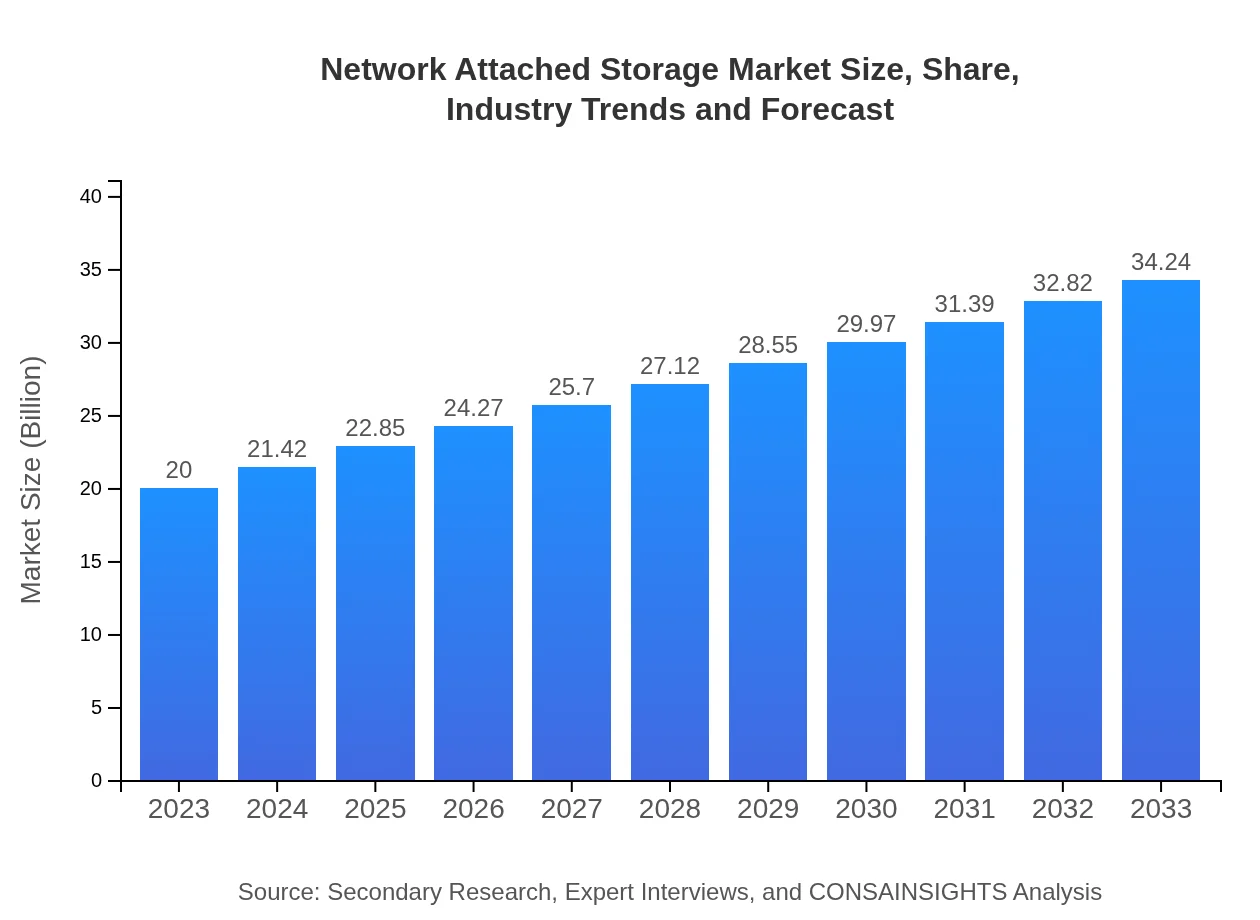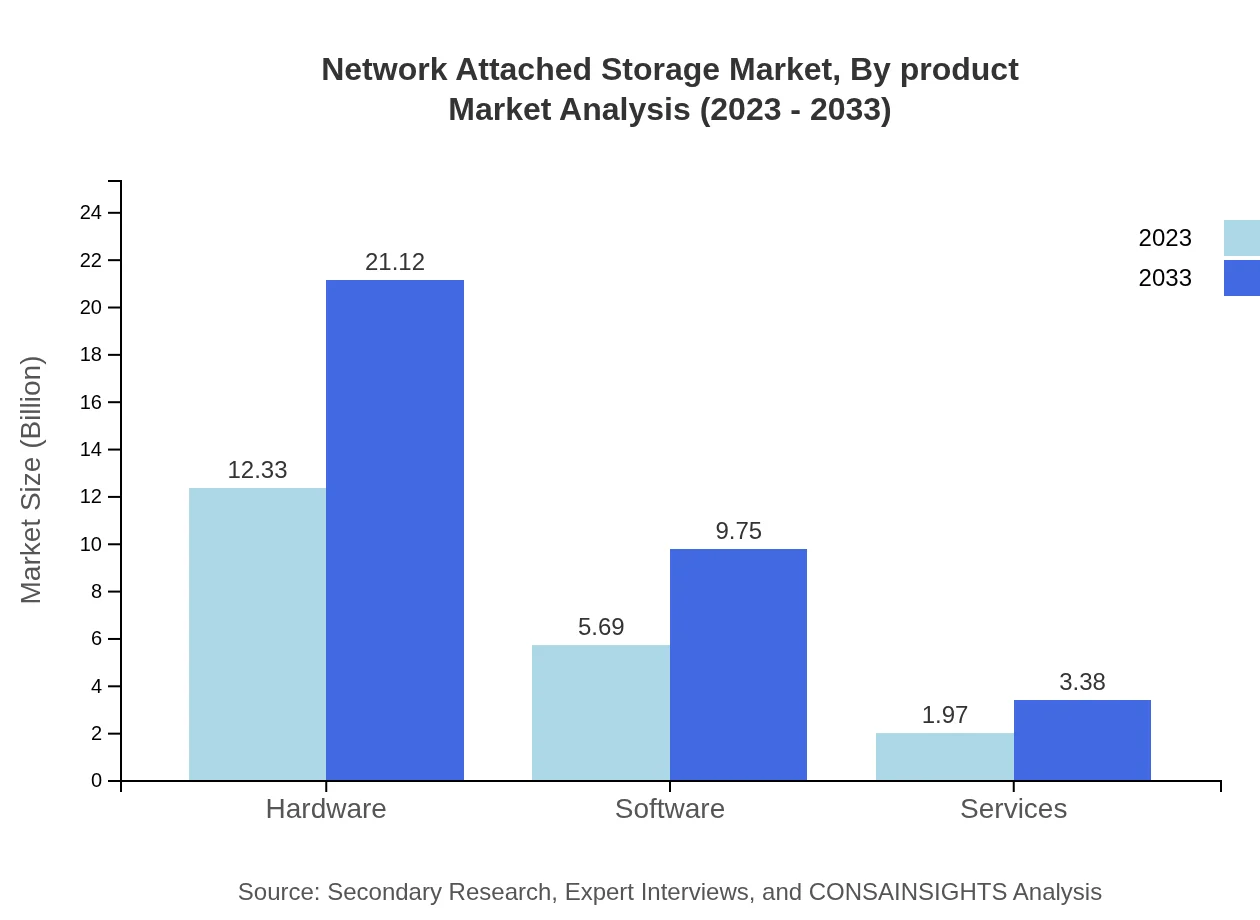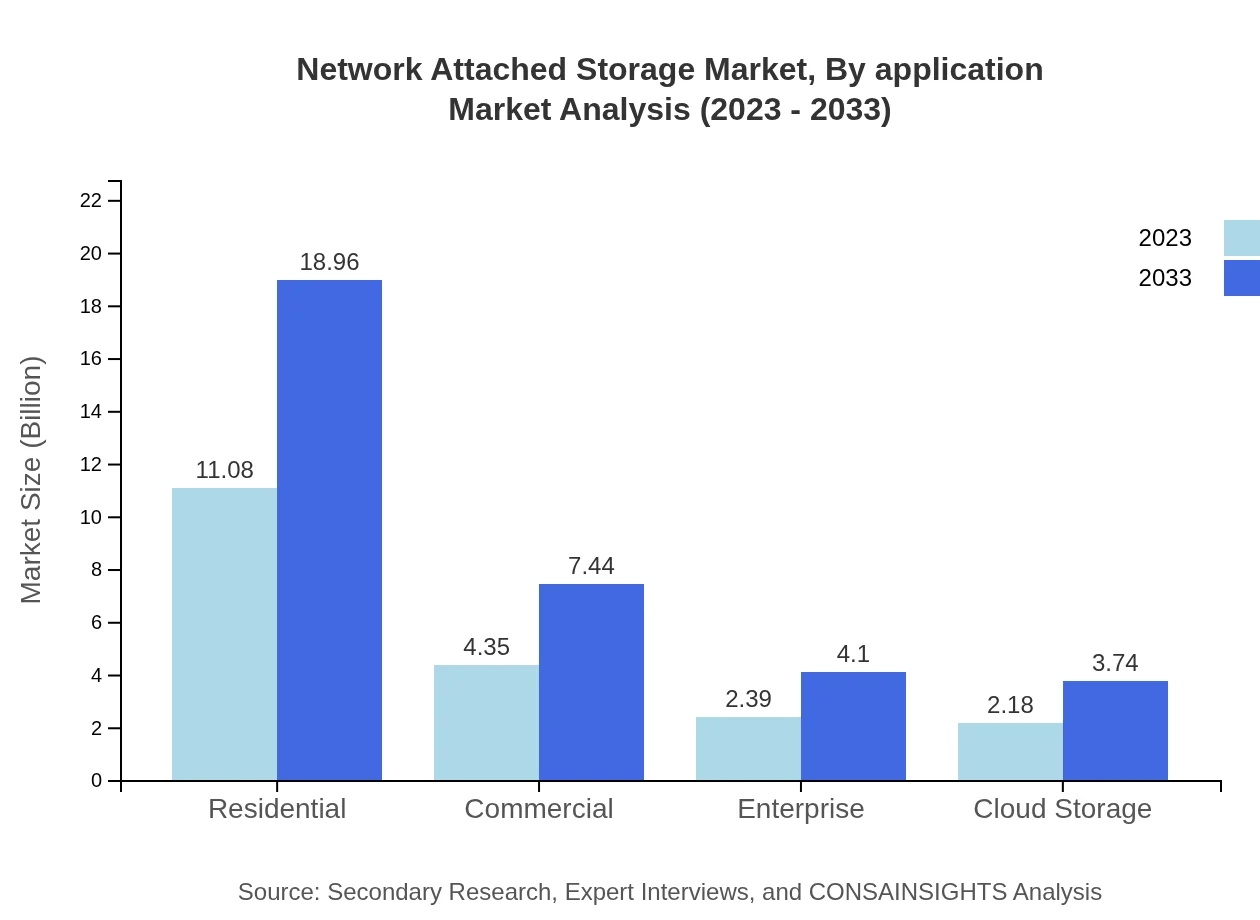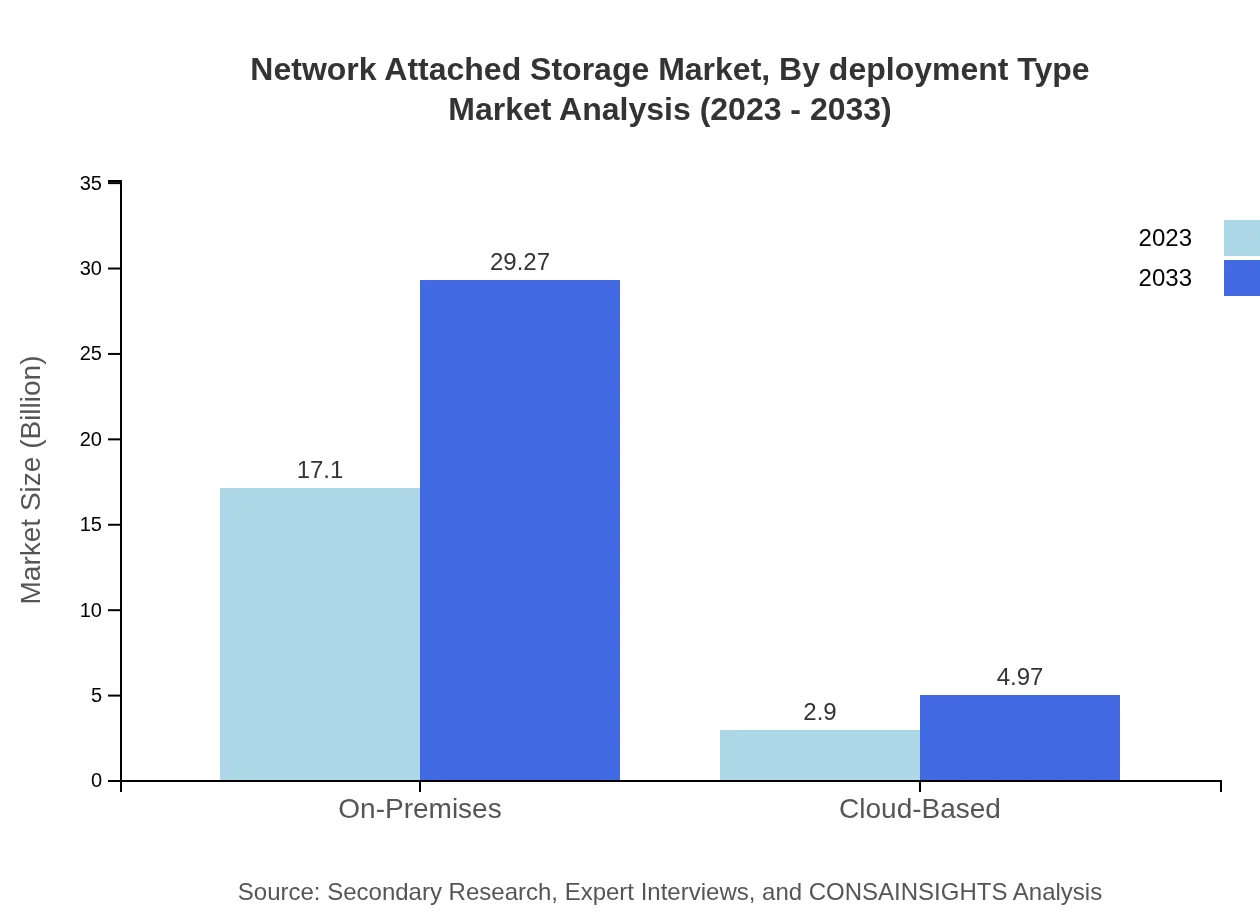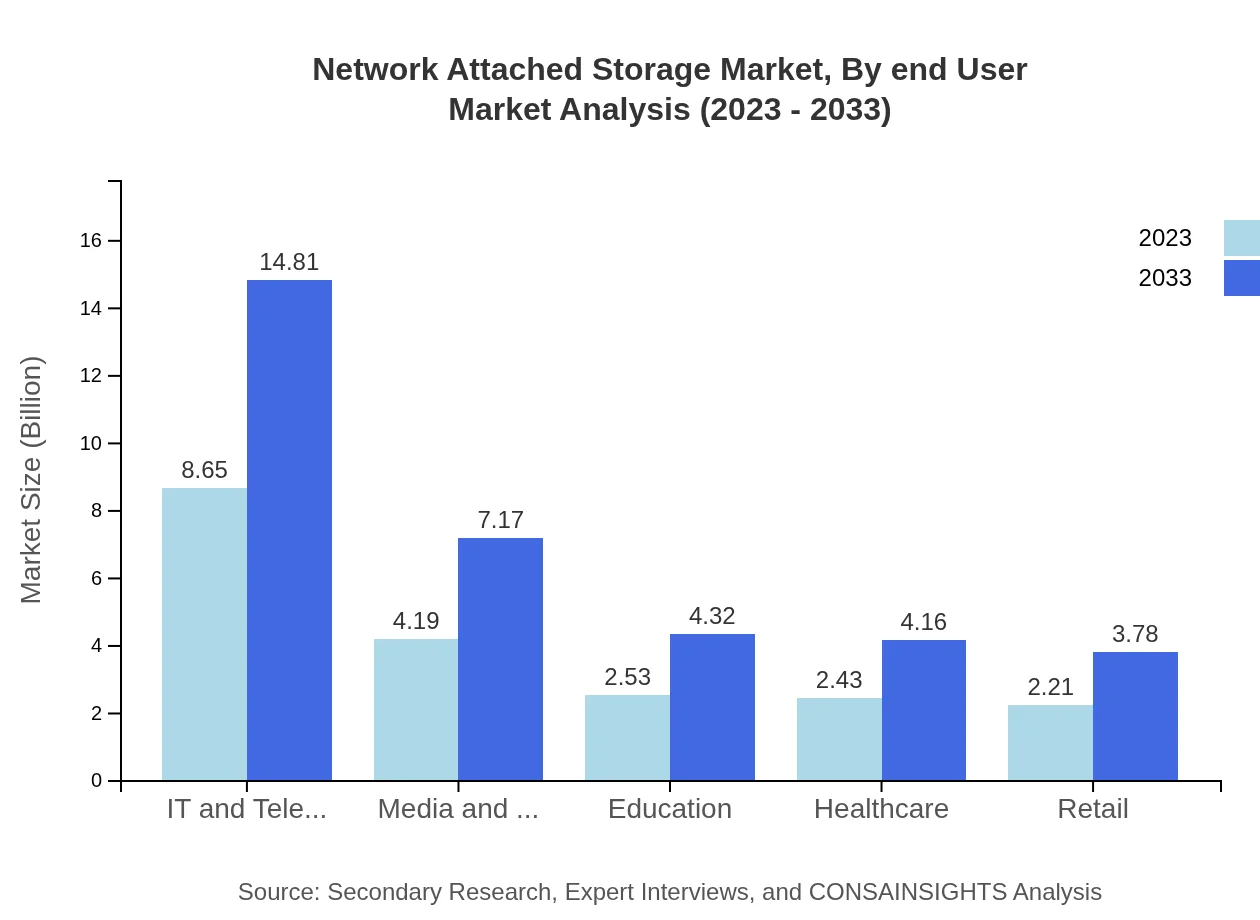Network Attached Storage Market Report
Published Date: 31 January 2026 | Report Code: network-attached-storage
Network Attached Storage Market Size, Share, Industry Trends and Forecast to 2033
This report provides a comprehensive analysis of the Network Attached Storage market for the forecast period from 2023 to 2033. It encompasses market size, growth trends, segmentation, regional insights, and a look at key players and future forecasts.
| Metric | Value |
|---|---|
| Study Period | 2023 - 2033 |
| 2023 Market Size | $20.00 Billion |
| CAGR (2023-2033) | 5.4% |
| 2033 Market Size | $34.24 Billion |
| Top Companies | NetApp, Synology, QNAP, Western Digital, Buffalo Technology |
| Last Modified Date | 31 January 2026 |
Network Attached Storage Market Overview
Customize Network Attached Storage Market Report market research report
- ✔ Get in-depth analysis of Network Attached Storage market size, growth, and forecasts.
- ✔ Understand Network Attached Storage's regional dynamics and industry-specific trends.
- ✔ Identify potential applications, end-user demand, and growth segments in Network Attached Storage
What is the Market Size & CAGR of Network Attached Storage market in 2023?
Network Attached Storage Industry Analysis
Network Attached Storage Market Segmentation and Scope
Tell us your focus area and get a customized research report.
Network Attached Storage Market Analysis Report by Region
Europe Network Attached Storage Market Report:
Europe's NAS market is expected to grow from 5.56 billion USD in 2023 to 9.52 billion USD by 2033. The increasing focus on data protection regulations such as GDPR and rising demand for cloud services are significantly influencing market trends, compelling businesses to invest in robust storage solutions.Asia Pacific Network Attached Storage Market Report:
In 2023, the Asia Pacific market is estimated to be valued at 3.92 billion USD, projected to grow to 6.72 billion USD by 2033. The region is characterized by rapid digitalization across sectors like retail and healthcare, creating a strong demand for scalable storage solutions. Major investments in cloud infrastructure and data security are further propelling the growth of NAS systems.North America Network Attached Storage Market Report:
North America leads in the NAS market with a value of 6.96 billion USD in 2023, projected to grow to 11.91 billion USD by 2033. Advanced technological infrastructure and high demand for secure data storage solutions in enterprises are key drivers of this growth. The region boasts a concentration of leading NAS providers, fostering innovation and competition.South America Network Attached Storage Market Report:
The South American market is valued at 1.77 billion USD in 2023, with expectations to reach 3.03 billion USD by 2033. The adoption of NAS technology in small to medium enterprises is on the rise, driven by the need for cost-effective storage solutions as businesses expand their digital capabilities.Middle East & Africa Network Attached Storage Market Report:
In the Middle East and Africa, the market is valued at 1.79 billion USD in 2023, with a projection of 3.07 billion USD by 2033. The growth in this region is driven primarily by an increase in digital transformation initiatives and a growing awareness of the importance of data security.Tell us your focus area and get a customized research report.
Network Attached Storage Market Analysis By Product
The Hardware segment of the Network Attached Storage market continues to dominate, with a market size of 12.33 billion USD in 2023, expected to reach 21.12 billion USD by 2033, maintaining around 61.67% market share. Software and Services are also crucial, with Software generating 5.69 billion USD and Services at 1.97 billion USD in 2023.
Network Attached Storage Market Analysis By Application
Applications of NAS systems span across various sectors. Notably, the IT and Telecom segment commands a market share of 43.25% in 2023, valued at 8.65 billion USD, with expected growth to 14.81 billion USD by 2033. Other significant applications include Media and Entertainment, Education, and Healthcare.
Network Attached Storage Market Analysis By Deployment Type
Deployment types include both On-Premises and Cloud-Based solutions, with On-Premises dominating at 17.10 billion USD and a market share of 85.49% in 2023, projected to grow to 29.27 billion USD by 2033. Cloud-Based deployments are also gaining traction, expected to increase from 2.90 billion USD in 2023 to 4.97 billion USD by 2033.
Network Attached Storage Market Analysis By End User
In terms of end-users, Residential applications lead in consumption with a substantial market share of 55.38% and a size of 11.08 billion USD in 2023. Enterprises and Commercial sectors follow closely, with significant projections for growth due to increasing data management demands.
Network Attached Storage Market Trends and Future Forecast
Tell us your focus area and get a customized research report.
Global Market Leaders and Top Companies in Network Attached Storage Industry
NetApp:
A key player in the NAS market, NetApp specializes in data storage and management solutions, focusing on efficiency and cloud integration.Synology:
Known for its innovative NAS devices, Synology revolutionizes data storage solutions with user-friendly interfaces and powerful software ecosystems.QNAP:
QNAP provides comprehensive storage solutions for various applications, catering to both home and enterprise environments with advanced technology.Western Digital:
As a leader in data storage, Western Digital offers a range of NAS products tailored for personal use to complex network environments.Buffalo Technology:
Buffalo delivers reliable NAS devices, focusing on providing effective storage solutions for small to medium businesses.We're grateful to work with incredible clients.









FAQs
What is the market size of Network Attached Storage?
The global network-attached storage market is valued at approximately $20 billion in 2023, with a projected CAGR of 5.4% extending to 2033. This growth underlines the increasing demand for data storage solutions.
What are the key market players or companies in the Network Attached Storage industry?
Key players in the network-attached storage market include companies like Synology, QNAP Systems, Netgear, Western Digital, and Seagate. These firms are crucial in shaping market dynamics through innovation and product development.
What are the primary factors driving the growth in the Network Attached Storage industry?
The growth in the network-attached storage market is spurred by rising data volumes from enterprises, cloud adoption, demand for scalable storage solutions, and the need for efficient data management, ensuring businesses can handle, share, and secure their data effectively.
Which region is the fastest Growing in the Network Attached Storage market?
North America is the fastest-growing region for network-attached storage, with the market expected to rise from $6.96 billion in 2023 to $11.91 billion by 2033. Other growing regions include Europe and Asia Pacific, reflecting global demand.
Does ConsInsights provide customized market report data for the Network Attached Storage industry?
Yes, ConsInsights offers customized market reports tailored to client requirements in the network-attached storage industry, enabling businesses to get insights pertinent to their specific needs and strategic direction.
What deliverables can I expect from this Network Attached Storage market research project?
Deliverables from the network-attached storage market research include comprehensive market analysis reports, segment insights, regional performance data, competitive landscape assessments, and growth forecasts tailored to client preferences.
What are the market trends of Network Attached Storage?
Current trends in the network-attached storage market include increased adoption of hybrid storage solutions, enhanced security features, growth in residential NAS applications, and the shift towards cloud integration optimizing data accessibility.

